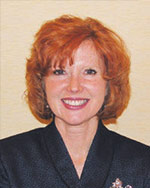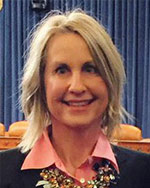COVID-19 relief: No margin for error
As agencies and institutions sounded alarms indicating the spread of the novel coronavirus, NRHA advocates went into high gear. NRHA CEO Alan Morgan began fielding a deluge of queries from local and national news outlets. “Who’s most at risk?” Morgan responded to one interviewer. “Elderly, low-income people with high health needs. That is rural America. If you were to have a cluster in a rural community it would turn bad quickly.”
The virus, Morgan pointed out, also threatened rural hospitals already at the financial brink. “If we’re not able to address the short-term cash needs of rural hospitals, we’re going to see hundreds of rural hospitals close before this crisis ends,” Morgan explained. “This is not hyperbole.”
NRHA member Mark Holmes indicated that the pandemic is “peeling off the bandage” that many have raised concerns about for years. “What this epidemic really exposed is the fragility of the rural health care infrastructure,” Holmes said.
Meanwhile, Maggie Elehwany, NRHA vice president for government affairs and policy, rallied her team to represent rural concerns on Capitol Hill as legislators hammered out a relief package for hospitals, health care providers, and workers suddenly bereft of their jobs due to the closing of service industries.
Finding solutions
Foremost among NRHA’s concerns for rural health care were hospital cash flow and support for provider agility in the crisis. Doctors, clinics, and hospitals needed to adapt procedures, billing capabilities, and locations — and do it quickly. Meanwhile, hospitals struggled either to find enough workers to care for mounting numbers of critically ill coronavirus patients or to retain staff during periods of low census due to a ban on elective procedures.
“In a small rural hospital, each employee wears several different hats, and if you lose just one of those, it’s like you’re losing a couple different employees, and soon the facility will be unable to function,” Elehwany said. NRHA member facilities have reported dozens of employees on quarantine at a time, which can halt operations at smaller facilities.
Brock Slabach, NRHA vice president of member services, offered that opening closed hospitals might offer a way to increase capacity. “Before we start considering putting up new hospitals, we have empty hospitals that could be reopened with much less pain,” Slabach reminded one interviewer. “Assuming the structures are sound, we could open them and use them. They would already be equipped with the necessary gas lines and other needed fixtures.” Slabach emphasized the importance of strong social networks in rural communities and noted that faith-based organizations are often central to caring for community members.
“I feel like we’re prepared,” said Lexington (Neb.) Regional Health Center CEO Leslie Marsh, an NRHA member. “That’s been our preparation mindset since the very beginning: What do we do in a worst-case scenario?”
Key grassroots advocacy
To ensure the stability of rural facilities, NRHA’s Government Affairs team enlisted the association’s grassroots member network to contact their senators and representatives, keeping them up to date on the changing language of coronavirus relief legislation as it passed through both chambers and urging them to report their needs to NRHA and their delegation. Member forums began to hum with reports, appeals, and clarifications.
Thanks to the relentless advocacy of this network, $10 billion of the CARES Act COVID-19 stimulus package was allocated to rural providers on April 22, and those providers gained increased access to loan programs and federal cash flow resources within weeks. NRHA’s was the most prominent voice calling for Small Business Administration’s Paycheck Protection Program loans to be made available to government-owned hospitals, a majority of which are overseen by rural counties. The change occurred just two days later.
In addition, the efforts of NRHA and its members made the regulatory landscape more rural friendly, including waiving the 72-hour rule for swing bed admissions, expanding telehealth in rural health clinics and federally qualified health centers, and easing restrictions on Medicare beneficiaries. As the crisis developed, NRHA began outlining further needs for rural aid. Using input from members across the country, NRHA has appealed to Congress and the Administration for equitable distribution of funds in successive COVID-19 relief packages to benefit rural facilities, patients, and providers.
“Rural America is not immune to this pandemic.”
— Alan Morgan
Hands-on help
To provide long-term assistance, NRHA is helping rural health care providers overcome barriers they face through the creation of the Rural COVID-19 Technical Assistance Center with the support of a generous grant of $200,000 from CoBank. The Technical Assistance Center has two primary focuses: finance and reimbursement, as well as operations and supplies. The latter includes personal protective equipment sourcing and distribution, testing and contact tracing, and long-term care collaboration, as well as a survey to gauge inventory so the association may help facilities prepare.
NRHA also recently partnered with Centene Corp. to embark on a five-year research project to study racial and ethnic health disparities in the COVID-19 pandemic. The project will help NRHA assess needs from across the country and ensure rural communities are equipped with knowledge, connections, and resources as the situation develops.
Far from over
At NRHA’s 2020 Annual Rural Health Conference, Elehwany indicated that the association’s pandemic relief advocacy pertains to the equitable distribution to rural providers of 20 percent of the remaining $60 billion in CARES Act relief still to be allocated. Beyond this, the association aims to make several aspects of existing pandemic relief permanent. The COVID-19 crisis is far from over, and NRHA will continue to advocate for the health and well-being of all rural Americans and fight to ensure rural providers have the resources they need to care for their communities during the pandemic and beyond.

Maggie Elehwany,
NRHA vice president for government affairs and policy

Mark Holmes,
UNC Chapel Hill Cecil G. Sheps Center for Health Services Research director

Leslie Marsh,
Lexington Regional Health Center CEO

Alan Morgan,
NRHA CEO

Brock Slabach,
NRHA senior vice president for member services
Photo © sanjeri / Getty Images
